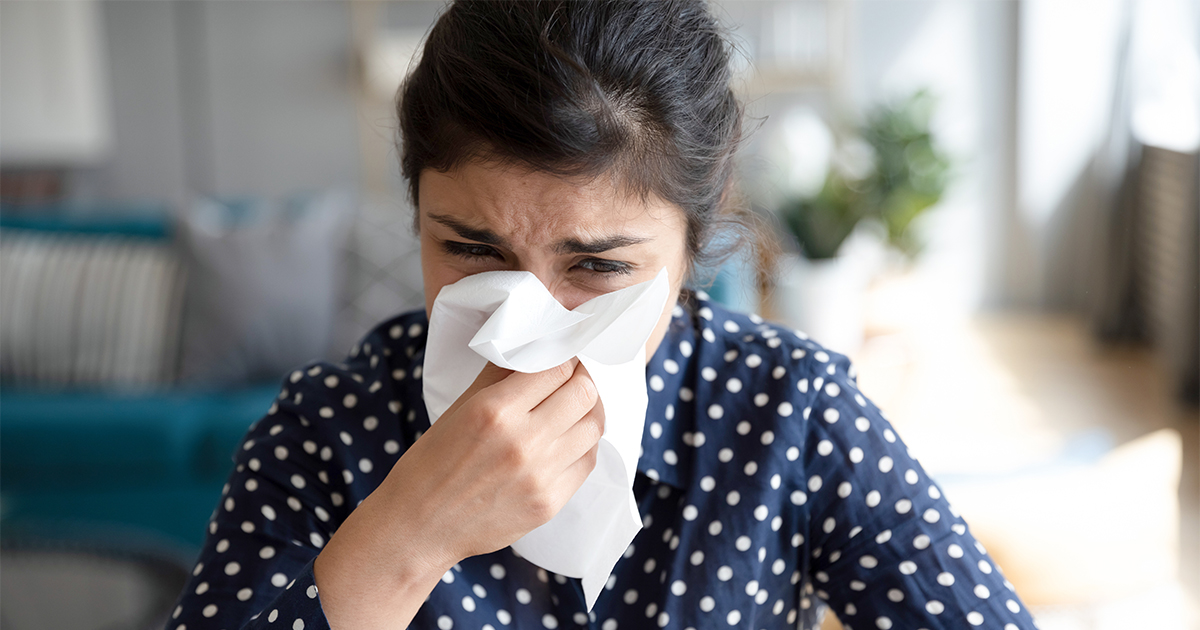
Developing allergies later in life — and what to do about it
If you’re an adult who doesn’t suffer from allergies, congratulations!
But don’t celebrate just yet. Those nasty symptoms – itchy eyes, runny nose, nasal congestion, sneezing and coughing – might still be in your future.
While about 80% of people with allergies acquire them during childhood, allergies can also develop later in life.
“I’ve seen allergies develop in people as late as their 60s and 70s,” said Kaylene Freitag, APRN, an advanced practice nurse specializing in allergies at OSF HealthCare. “They can happen any time.”
What are allergies?
“An allergy occurs when a person’s body is exposed to something, and their immune system sees it as a foreign invader and has an overactive response,” Kaylene said. “The body produces antibodies to fight the substance, which triggers the allergy symptoms.
“These ‘invaders’ are things that would never actually cause harm, such as pollen, animal dander, dust mites, medications and latex. They’re things that most people’s bodies tolerate just fine and have no problems. But for unknown reasons, some people either have an allergic reaction during childhood or later as an adult.”
Seasonal and perennial allergies
You can develop allergies no matter where you live, and about 20% of adults suffer from one or more types. Inhalant allergies are caused by things people breathe in, and there are two types: seasonal and perennial.
Think you may have allergies?
Seasonal allergies only occur during specific times of the year. While people can be allergic to certain trees and grasses year-round, the pollen from these plants is the allergen (the substance causing the allergic reaction) that brings seasonal discomfort. Once the pollination season is complete and the pollen dissipates, allergy symptoms tend to subside.
How long seasonal allergies last depends on where you live. For example, the three main allergy seasons in the Midwestern United States are:
- April and May: When trees pollinate
- May, June and early July: When grasses pollinate
- Late August, September and early October: When ragweed pollinates
Perennial allergies can occur year-round and are caused by things like:
- Animal dander
- Dust and dust mites
- Indoor mold
“Perennial allergies can actually be worse during the winter months because people are indoors more often, and the windows are closed,” Kaylene said.
Outdoor molds can also be present any time of the year. This includes wetter periods when there’s significant rain and late in the year when leaves are decomposing and farmers are tilling up the ground after harvest.
Are allergies hereditary?
“Genetics are certainly a factor in determining whether or not a person has allergies,” said Kaylene. “If a parent has allergies, their children are much more likely to have them. However, other factors can also play a part. Prior illnesses, certain foods, pregnancy and environmental factors like pollution can all change a person’s immune system over time and make them susceptible to allergies.”
Allergies that are inherited genetically can also skip a generation. So, even if your parents don’t have allergy symptoms, that doesn’t mean that you’ll never have them. For example, if one of your parents has a spring tree allergy, you might develop the same allergy – or not. Instead, you might develop a ragweed allergy that makes you sneeze in the fall.
How do I know if I have allergies?
If you begin to experience allergy symptoms, talk to your primary care provider. They can conduct a simple blood allergy test or refer you to an allergist for an allergy skin test.
Getting tested is important because it lets you know what’s causing your symptoms so they can be treated properly. In many cases, symptoms are not caused by allergies, which means allergy treatments won’t work.
Treatments
Unfortunately, there isn’t a specific diet, exercise or supplement that will prevent allergies from developing. So, the only remedy is to treat the symptoms.
Treating allergy symptoms is important because not doing so can lead to secondary infections. For example, sinus infections and asthma can develop from severe pet dander allergies.
There are three primary treatments:
- Environmental controls: These include things like keeping windows closed during outdoor mold and pollen seasons, keeping pets out of sleeping spaces and limiting pets’ outdoor time during pollen seasons.
- Allergy medications: “These include oral antihistamines, eye drops and steroid nasal sprays,” Kaylene said. “These medications have the advantage of working fairly quickly, but they typically have to be taken daily.”
- Immunotherapy (allergy shots): These shots help a person build immunity to an allergen over a period of years.
If you have allergies, an allergist can determine which treatment is most appropriate for you.